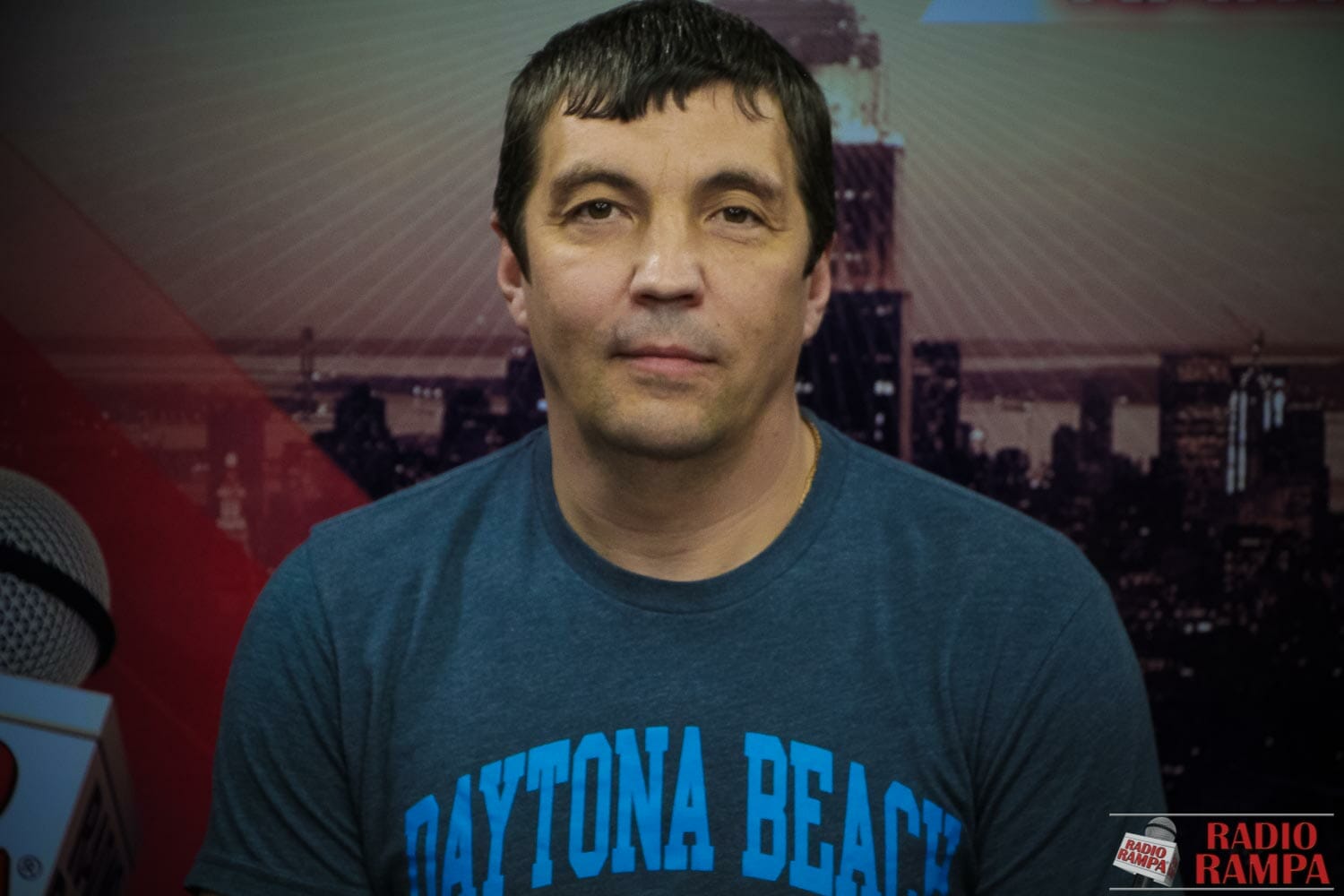 Mihail Shpilevoj, 48, started karate 15 years ago, while still living in Latvia – he wanted to get in shape, and did not indeed dream that he will become the second man in the world in Shotokan karate couple years later. Now, being a trainer at Sambo MMA/Universal System JW in Manalapan, NJ, he trains young karate adepts about the philosophy of martial arts and how it can change one’s life for the better.
Mihail Shpilevoj, 48, started karate 15 years ago, while still living in Latvia – he wanted to get in shape, and did not indeed dream that he will become the second man in the world in Shotokan karate couple years later. Now, being a trainer at Sambo MMA/Universal System JW in Manalapan, NJ, he trains young karate adepts about the philosophy of martial arts and how it can change one’s life for the better.
Radio RAMPA: How did your journey with karate start?
Mihail Shpilevoj: Before starting karate in 2003, I was training boxing and judo. I started karate as I wanted to get into shape, I did it literally for my health’s sake. And then I loved what karate was bringing into my life. But also, I was not too young – I was coming from work – tired – and then, I always had to push myself and choose – whether to stay on the couch and stay sorry or go to the class. 99% of the time I chose class. After the intensive training, and I felt I did a good job – I felt I achieved something. I fell in love with the sport. Karate was pushing me constantly to go higher and higher. It was constantly pushing myself forward and became more disciplined. When you start to see the progress, you get more and more joy.
RR: Let’s talk about teaching and spreading your knowledge and experience to your students – how did you start teaching?
MS: When I got black belt in karate, I became the assistant to the instructor, and after that I started my own school in Latvia. Then I came to the USA, and my previous school had to merge with other school in Latvia. Here in the USA, I started to teach – also here in the US, I got interested in campo style of karate. I met a person who was training another style – sambo – and I was interested in learning that too. So, we started cooperating – I was trying to improve their martial arts technique, and they taught me some new elements of new styles as well.
RR: Martial arts is not only sport – it is the whole philosophy. What do you convey to your students while teaching them?
MS: Karate should always be taught with the philosophy. It is a sport but teaching and training karate without the discipline is impossible. One Japanese sensei once said, “Karate starts from discipline and it starts from the first entrance to the sport arena.” If you don’t have discipline you won’t be able to learn karate. On the top of that, there is etiquette and students behavior is changing – they become more disciplined, which affects not only their classes, but their whole life. The best example is one of my students: when he started training karate, he was constantly distracted – looking in the mirror, looking around – it interrupted his learning process. But then, little by little, he was trained to concentrate, and he is now paying much more attention to what he is doing – it helps him in the real life too. In karate, when you are not concentrated, you can not only hurt yourself, but also hurt others – that is why discipline and concentration is so important.
RR: What makes you different from other teachers/instructors?
 I know that there are many good instructors around here. I am determined to make my students the best, and strong, and since, the karate is becoming the Olympic game, I would hope I could help them become the Olympic champions one day. There is no better feeling and sense of accomplishment, when you hear “Thank you” from your students. I also want to share all the knowledge I have with my students. It feels good to see my students use the knowledge they acquired from me. It feels amazing to see them achieve something. Also, many of my students are Russian-speaking, or they come from the Russian-speaking families, but since they are born in America, they are losing their native language. I know that many parents are happy, that I speak Russian with their children – it helps them preserve their ethnicity.
I know that there are many good instructors around here. I am determined to make my students the best, and strong, and since, the karate is becoming the Olympic game, I would hope I could help them become the Olympic champions one day. There is no better feeling and sense of accomplishment, when you hear “Thank you” from your students. I also want to share all the knowledge I have with my students. It feels good to see my students use the knowledge they acquired from me. It feels amazing to see them achieve something. Also, many of my students are Russian-speaking, or they come from the Russian-speaking families, but since they are born in America, they are losing their native language. I know that many parents are happy, that I speak Russian with their children – it helps them preserve their ethnicity.
RR: What do you consider to be your biggest achievements?
MS: Second dan, black belt in Shotokan Karate as well as second place in Karate Shotokan World Championships in 2012. Now I am preparing to get a black belt in Shaolin Kempo Karate. I am constantly trying to improve myself, try something new, and then bring it to my students. I also learn to master Sambo, another martial art.
RR: But you have numerous achievements! Which one is the most important to you?
MS: Every one of them was equally important for me – I was working very hard to achieve each of them. It is not easy to get a black belt. When I was passing for my first black belt, there were students from 6-9 years old to 50 years old next to me – this itself proved to be a challenge. We were all doing the same tests – sometimes you must admit, it becomes a little embarrassing for a grown man to compete with young children for the same title – and you still must show you are not scared and “kill” the feeling of embarrassment. I cannot say that one of these achievements is more important than the other.
RR: But you were the second man in the world! How did it change you, did it?
MS: It was overwhelming for me – it was very difficult to achieve! I had two training every single day, plus, I was working – I could not believe I was able to achieve it. It was long and difficult. When I got it, I felt an enormous joy.
RR: What makes you the proudest, when talking about your students?
MS: Maybe they do not have a lot of big achievements yet – they are still young, and they are learning fast. They are getting ready to compete and soon I am sure I will take them to their first competition and I am sure of their future – they are making an amazing progress. I have also served as a judge in many of martial arts competitions back in Europe – I have comparison with other schools too – can tell the progress of my students is great.
Radio RAMPA also had a chance to talk to Mihail’s sister Natalia Burkovskiy, and Mihail’s son, Nikita Shpilevoj.
Asked how karate changed her brother’s life, Natalia just answers, “he puts so much work into this. And he is getting so much joy from it – every achievement was so important for him. He was working hard for each one of them. We were very proud of him. When he was second in the world, our family was overwhelmed! I think when my brother is here in the USA, he can bring so much – being an instructor is not only a job for him – he knows how hard it is, he puts his soul into this. He puts everything in his students. I myself saw how his students improved themselves quickly – it was amazing for me!”
Mihail’s son, 17-year Nikita, also trains karate. “My friend suggested I started training taekwondo – but I chose karate, as my father was training it,” Nikita says. “I just liked it. I have been doing it for five years already. First, that puts discipline in my life – it’s the first point of karate. And as the coaches say, you don’t have to fight, you have to protect yourself – you never start a fight in karate.” Asked, how training karate together benefits his relationship with his dad, Nikita says, “we help each other, sometimes we practice on each other.”
“I leave the decision up to my son, but if he chooses to continue with the karate, I will do everything I can to help him, if he allows,” says Mihail. “If he wants to do something else, that is good as well.” He adds. “Of course, it makes me feel good, that my son is doing what he likes to do, and that we are able to do it together.”
Interview conducted by Monika Adamski.





